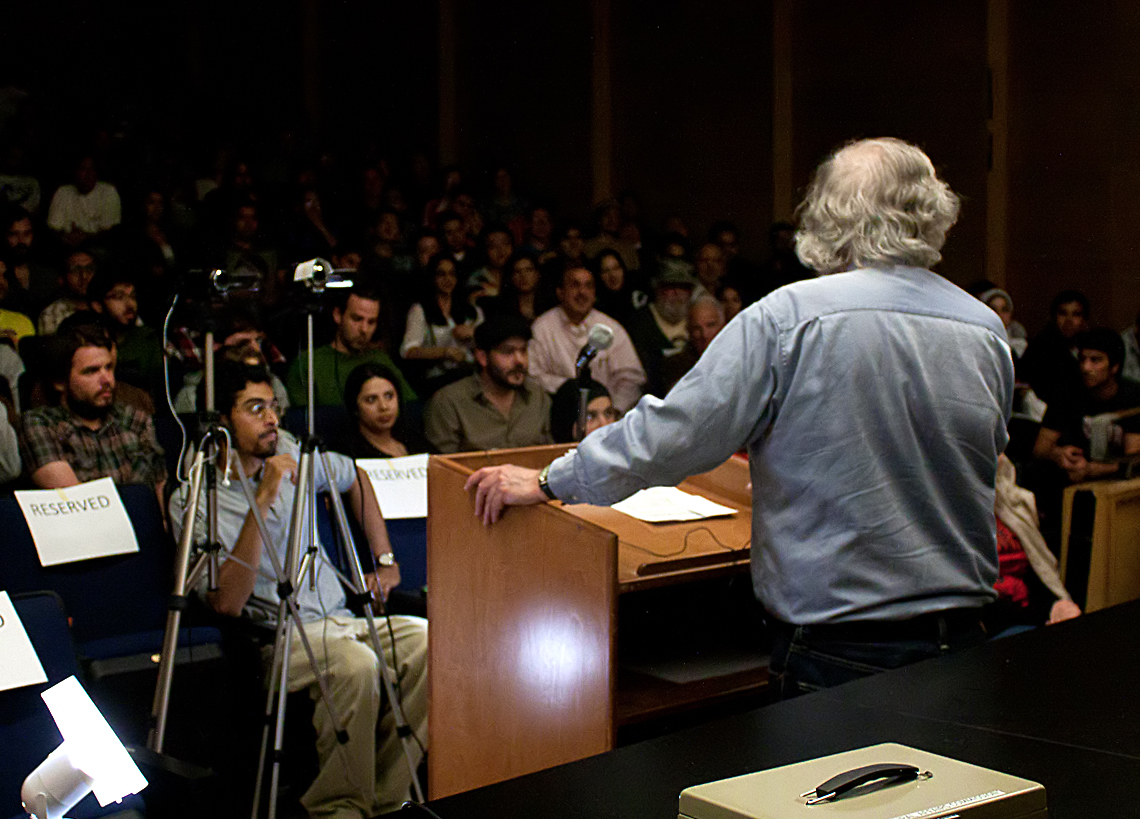By 6 p.m., a line of eager fans who had snaked around Young Hall were attempting to push themselves into the already-packed room, lining the aisles and crowding all of the doorways.
Meanwhile, the lucky ones who made it inside were clapping with gusto, hoping to provoke the start of the lecture they had been waiting in line for since 4 p.m.
The star of the show sat patiently in the front row, waiting for his cue to walk onstage. His fame and celebrity was broadcast on one attendee’s shirt, which read, “I <3 Noam Chomsky.”
One of the most-cited living authors, the 82-year-old Massachusetts Institute of Technology professor is internationally known for his groundbreaking work in linguistics, psychology and cognitive science.
He has also been a target of criticism for challenging long-established and widely believed studies of behavior.
The controversy surrounding Chomsky has since shifted toward his outspoken political views regarding U.S. foreign policy, specifically in the Middle East.
On Saturday night, the soft-spoken professor delivered a frank critique of U.S. foreign policy and its support for Israel.
In the course of an hour and a half, Chomsky denounced the U.S. government for its support of the Israeli government and “its moral degeneration and ultimate destruction.” He also dissected historical events leading up to and surrounding the conflict in Palestine and Israel.
“When (the U.S. and its supporters) invade and occupy countries, that’s stabilization. Basic U.S. culture is, “˜We own the world,'” Chomsky said, to which the audience roared in agreement.
Chomsky criticized U.S. policy toward the Palestinians’ two primary political factions, Fatah and Hamas, which last week announced the formation of a new coalition.
Israel and the U.S. have labeled Hamas a terrorist organization and have refused to negotiate with its leaders.
But according to Chomsky, the American government opposes a coalition because it does not want a unified Palestinian state.
For some attendees, Chomsky’s lecture reinforced his status as a leading political activist.
“Professor Chomsky has the guts to tell the truth,” said Ehsan Zahedani, a fifth-year political science and Near Eastern languages and cultures student.
Others were simply curious about the name. Third-year psychology student Demi Chang heard about Chomsky in her linguistics class and hoped to see one of the founding fathers of the discipline in person.
“I don’t know a lot about his political views, but we heard about him in class,” Chang said. “I’m just interested.”
The lecture ended with a Q-and-A session and a standing ovation that lasted several minutes.
Hosted by the Students for Justice in Palestine at UCLA, the student-run event was not advertised outside of the campus, but many of the event’s attendees were not associated with UCLA.
Shaan Sharma, a third-year computer engineering student, drove from Cal Poly Pomona to come see the professor speak.
“I definitely think he’s doing something good by bringing the topic to the forefront. I just want to see what his take is today,” Sharma said.
